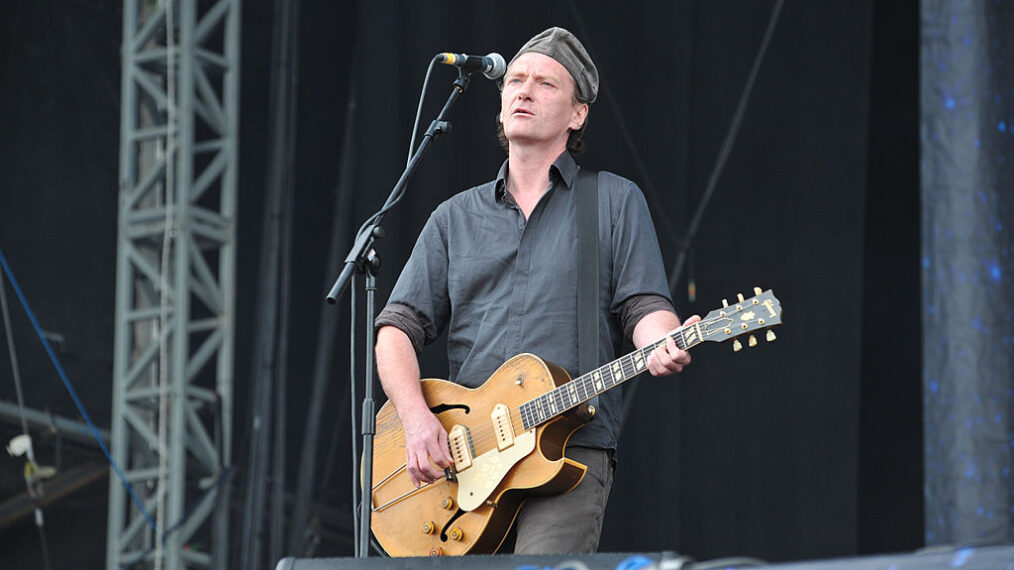
Killing Joke’s Geordie Walker was born Kevin Walker on December 18, 1958, and left an indelible mark on the world as an English rock musician. His musical journey was primarily defined by his role as the guitarist for the influential post-punk group Killing Joke, a band that would become synonymous with his unorthodox and widely acclaimed electric guitar playing.
Walker’s passion for the guitar was ignited at a young age, at the tender age of ten, when he was profoundly moved by the distinctive guitar sound in “Sabre Dance” by Love Sculpture. The impact was so significant that he confessed, “I used to go mad when it came on the radio.” This early fascination with the power of the instrument laid the foundation for his future as a groundbreaking guitarist.
When Geordie Walker was fourteen, his family relocated from Chester le Street to Bletchley in Buckinghamshire. It was during this period that he earned the nickname “Geordie” due to his north-eastern accent. Undeterred by the relocation, Walker delved into his passion for the guitar, driven by a daily ritual of locking himself in his bedroom, turning the amp up full, and passionately playing. His dedication to his craft became evident, and he quickly grasped the importance of melody lines over solos.
The pivotal moment in Geordie Walker’s musical journey occurred during Christmas in 1973 when his mother suggested he try a Gibson Les Paul, reminiscent of a concert she attended with Jimi Hendrix on the bill. The experience was transformative, and he fondly recalled his mother’s decisive verdict: “We’ll take it.” Walker worked two jobs at the time to save money, eventually acquiring another guitar, a Gibson SG Junior.
Geordie Walker’s trajectory took a significant turn when he moved to London to study architecture and responded to an advertisement by Jaz Coleman, the singer of Killing Joke. Despite having no prior experience playing in a band, Walker became a founding member of the group in March 1979. The Turn to Red EP marked his first release with Killing Joke in October 1979, followed by their debut self-titled album in October 1980. Over the years, Geordie Walker contributed to the band’s extensive discography, recording fifteen studio albums between 1980 and 2015.
.
The Killing Joke holds a unique place in music and pop culture, known for its relentless energy and the influential impact it has had on various genres. Formed in 1978 in London, Killing Joke emerged at the intersection of punk, post-punk, and industrial, bringing a dark, abrasive sound that became an archetype for what would later evolve into industrial rock and metal.
Known for combining a bleak, apocalyptic atmosphere with tribal drums, the grinding guitars of Geordie Walker, and the commanding presence of frontman Jaz Coleman, the band created a sound that was raw, primal, and politically charged. Over the years, Killing Joke’s uncompromising vision has resonated deeply with audiences and artists alike, cementing their legacy as pioneers in alternative music.
From their self-titled debut album in 1980, Killing Joke established their distinctive sound, one that resonated with the disillusioned, the angry, and those who felt alienated from mainstream culture. The album featured standout tracks like “Requiem” and “Wardance,” which embodied their fusion of punk energy and industrial experimentation.
Coleman’s intense vocals combined with Geordie Walker’s searing guitar riffs, Youth’s heavy basslines, and Paul Ferguson’s tribal drumming to create a visceral soundscape. Killing Joke’s music wasn’t merely an act of rebellion—it was a dark prophecy. Coleman, especially, became known for his fascination with esoteric subjects, political themes, and existential concerns, which he frequently integrated into the band’s lyrics and image.
Thematically, Killing Joke’s music often focuses on topics like social collapse, environmental disaster, and political corruption. Their apocalyptic tone, seen especially in songs like “The Wait” and “Pssyche,” reflected the anxieties of a generation facing nuclear fears and societal unrest.
Their lyrics didn’t just speak of an impending disaster; they reveled in it, almost as if encouraging listeners to confront and even embrace the darkness around them. This approach resonated with many in the post-punk scene, but Killing Joke’s reach extended far beyond. They were an inspiration for a diverse array of artists across genres—especially in heavy metal and industrial rock, influencing bands like Metallica, Nine Inch Nails, Nirvana, and even pop artists with darker aesthetics.
Their sound evolved through the years, with albums like Night Time (1985) introducing a more polished, accessible sound while still retaining their signature intensity. This album produced one of their biggest hits, “Love Like Blood,” which is celebrated for its powerful melody and introspective lyrics, revealing a slightly more accessible side to Killing Joke without sacrificing their edge. Despite occasional shifts in style and lineup changes, Killing Joke consistently remained true to their core ethos: questioning authority, challenging norms, and exploring the depths of human nature.
Part of Killing Joke’s lasting influence comes from their fearless exploration of dark and controversial topics, as well as their adaptability. While their sound evolved, their message and intensity remained consistent. Over four decades into their career, they continue to tour and release music, with their 2015 album Pylon being as well-received as any of their earlier work. This longevity is a testament to the band’s ability to resonate with successive generations, each finding something relevant in Killing Joke’s ominous warnings and relentless rhythms.
In a musical landscape where trends come and go, Killing Joke’s uncompromising vision and influential sound have kept them relevant. They remain a band that refuses to be categorized, standing at the crossroads of punk, industrial, and metal. Their legacy is one of intensity, darkness, and provocation—qualities that ensure their place as one of the most important and enduring bands in alternative music.
Geordie Walker’s musical prowess extended beyond Killing Joke, as he became a member of industrial music supergroups Murder, Inc. and The Damage Manual. His versatility and creative energy allowed him to explore different facets of the music industry, leaving an imprint on various projects.
In the mid-1990s, Geordie Walker found himself in Royal Oak, Michigan, living with his wife Ginny Kiraly and his son Atticus. During the recording of “Hosannas from the Basements of Hell” in 2006, he showcased his production skills by working with the UK girl punk rock act Mary–Jane at Faust Studios in Prague. Geordie Walker later made Prague his residence, collaborating with Studio Faust Records, where he contributed to recording other artists’ music.

Throughout his career, Geordie Walker drew inspiration from diverse sources. Love Sculpture’s “Sabre Dance” left an enduring impact on him, as he admired how the guitar was used as a musical instrument to convey atmosphere, transcending conventional playing styles. He also cited Siouxsie and the Banshees’ debut album, “The Scream,” as influential, especially appreciating original guitarist John McKay’s refreshing chord structures.
Kevin “Geordie” Walker’s legacy extends far beyond the notes he played on his guitar. His contributions to Killing Joke, as well as his involvement in various musical projects, showcase a musician who constantly pushed boundaries and sought to create unique and atmospheric sounds. As fans reflect on his life and career, they remember a guitarist who embraced the unconventional, leaving an indelible mark on the world of rock music.
Geordie Walker died in Prague on November 26, 2023, two days after suffering a stroke.
Check out Killing Joke on Amazon.
Check out Geordie Walker on Amazon.
If you liked this article, please share it with your friends and family, and why not check out some other Musicians who died in 2023.
.

